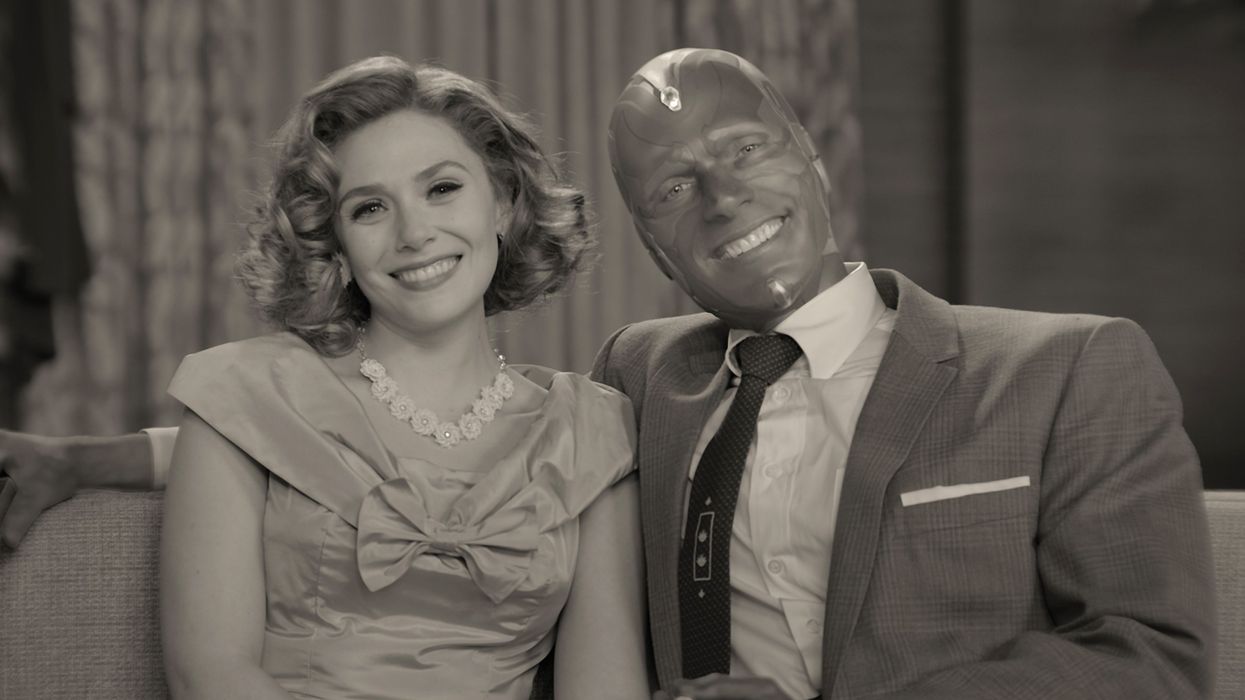How Was 'WandaVision' Inspired by Watching TV?
There's an entire era of family sitcoms waiting to be lampooned...

If you're like me, you loved being transported week in and out to a TV Land inside one of your favorite Marvel character's minds. WandaVision was one of those shows that surprised you by what seemed familiar. You knew the themes from the shows you grew up watching, but what you didn't know was where we'd go with them inside this story.
So let's get to the bottom of where it came from and how these decisions were made.
Decider sat down with WandaVision head writer Jac Schaeffer to talk about how the story came to be. We picked some of our favorite quotes. Keep reading.
How Was WandaVision Inspired by Watching TV?
Starting off, where did the idea for the show come from? Schaeffer told Decider that it actually came from the top down.
"The idea was [Marvel Studios president] Kevin Feige’s idea. It’s his genius brain that put the two things together. For me, my initial reaction was, 'That’s insane. That probably will never work—but what if it does? And if it does, I would like to be a part of it.' I think we all understand what the feeling of seeking comfort in the entertainment that we love [feels like]. Whatever that is, you know, it doesn’t have to be sitcoms, it doesn’t have to be TV, whatever. In the year of our Lord 2021, what we reach for is entertainment and it soothes us in such a sort of holistic way. And I think it’s always been like that. Storytelling is as old as humanity itself. So I don’t know—it seems like a bananas concept on paper, but once you take two seconds to examine it, it’s wildly intuitive."
I think it's interesting to hear how Feige works with the writers of the shows and movies to help ideas along, and also brainstorms worlds for the shows. This kind of hands-on production is amazing when it goes right, as it did here.
It's one thing to think of all this, but how do you write it? And what does it look like on the page?
Schaeffer said, "The scripts were structured with a visual language so that you knew which mode you’re in. So when it was in sitcom mode, especially the classic sitcoms—I don’t know if you’ve seen those scripts before, but they have a very [specific format]. The action is in all caps, the dialogue is actually double-spaced. But in a contemporary screenplay, it’s single-spaced, action lines are lowercase or traditionally cased. So we used that to be prescriptive of, this is the mode we’re in."
Of course, a lot is done via collaboration with the editors, production designers, DP, and the entire crew (and cast). Over the course of the series, we get to know Wanda and Vision more and more. We understand the power of her grief but also of the world she built.
One of the cooler things was that we went through an entire era of comic book costumes, finally landing on Wanda's new look within Marvel. That was always part of the plan.
"The needs were, you know, there’s the emotional story, there’s the grief story, and then there’s the MCU story. The goal was to have all of that synthesize and support each other and sort of fold into each other. And I think for the most part, a lot of that happens. But yeah, that was part of the assignment, especially for this show, that we wanted a becoming for her. We wanted to see her take the mantle of the Scarlet Witch, and then in the MCU, when you get that [moment], then you get the big costume. Then there’s an enormous amount of like conversations and Mayes [Rubeo] and Joseph [Feltus], the incredible wardrobe department."
I loved reading this interview because it gave such a deep understanding of the decisions made throughout the first season of the show.
I'm interested to see where the show can go from here. We saw Wanda grow into someone interesting and with her own agenda. Now that she's broken out of one reality, I think there are lots of opportunities to be ingenious with the second season as well. But there are big shoes to fill based on what we got so far.
Check out the whole thing at Decider and let us know what you think in the comments!











